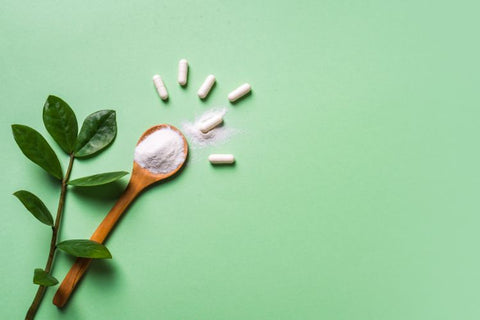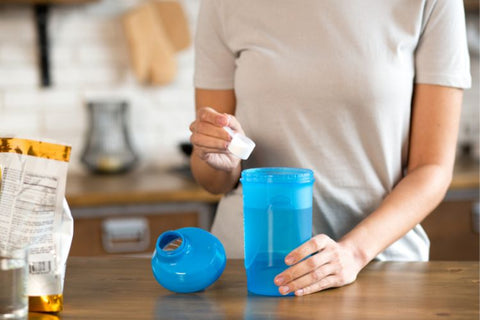Collagen is a fascinating protein, often referred to as the "body's building block." It's the most abundant protein in humans, making up approximately 25-35% of our total protein content. Its importance is undeniable, playing a crucial role in maintaining strength, structure, and overall health. This introduction will delve into the fascinating world of collagen, exploring its definition, significance, and diverse sources.
What is collagen?
Collagen is a fibrous protein, the main component of connective tissues throughout the body. It can be thought of as the body's internal scaffolding, providing strength, elasticity, and support to various structures like skin, bones, muscles, tendons, and cartilage. Unlike most proteins, collagen has a unique triple-helix structure, akin to a rope woven from three strands. This intricate structure contributes to its remarkable strength and flexibility.
Importance of Collagen in the Body
Collagen's importance cannot be overstated. It plays a vital role in numerous bodily functions, including:
- Skin health: Collagen provides plumpness and elasticity to our skin, keeping it youthful and resilient. Its natural decline with age contributes to the appearance of wrinkles and sagging.
- Joint health: Collagen forms the framework of cartilage, which cushions our joints and facilitates smooth movement. Its depletion can lead to joint pain and stiffness.
- Bone health: Collagen is a vital component of bone matrix, contributing to bone density and strength.
- Muscle health: Collagen helps maintain the structure and function of muscles, supporting movement and athletic performance.
Types of Collagen and Their Functions
Collagen isn't a single entity, but a whole family of proteins! There are over 28 identified types, each with a unique structure and function. Let's delve into the three most common and important types:
1. Type I Collagen: The Superstar of Strength and Structure
- Location: Predominantly found in skin, tendons, bones, and teeth.
- Function: The heavyweight champion of collagen, Type I provides strength, stability, and structure to these tissues. Think of it as the steel beams in your body's internal scaffolding.
- Fun Fact: Makes up a whopping 80-90% of your total collagen content!
2. Type II Collagen: The Joint Whisperer
- Location: Found in elastic cartilage, cushioning the ends of bones in your joints.
- Function: Acts like a shock absorber, providing elasticity and resilience to your joints, enabling smooth movement and reducing friction.
- Fun Fact: Plays a crucial role in joint health and preventing osteoarthritis.
3. Type III Collagen: The Versatile Supporter
- Location: Widespread in skin, blood vessels, muscles, and various organs.
- Function: A jack-of-all-trades, Type III provides support, and structure, and aids in wound healing. Think of it as the all-purpose glue holding your body together.
- Fun Fact: Essential for maintaining skin health, muscle function, and organ integrity.
Role of Collagen in Connective Tissues
Collagen is the main building block of connective tissues, the glue that holds your body together. It forms a complex network of fibers that bind cells, tissues, and organs, providing them with:
- Strength: Resists tension and pressure, keeping your bones and muscles strong.
- Flexibility: Allows tissues to stretch and bend without tearing, enabling movement.
- Support: Provides a framework for various structures, like skin, bones, and blood vessels.
- Wound Healing: Plays a crucial role in repairing damaged tissues by forming scar tissue.
Imagine a rope bridge suspended over a canyon. The collagen fibers are like the sturdy cables, the cells and tissues are the planks, and the canyon represents the space between them. Collagen bridges these gaps, ensuring everything stays connected and functions properly.
Understanding the different types of collagen and their roles in the body provides valuable insight into maintaining overall health and well-being. By supporting your body's natural collagen production or exploring supplemental options, you can keep your internal scaffolding strong and resilient for years to come.
Some Sources of Collagen
Natural Sources:
- Bone broth: Simmering bones and connective tissues releases collagen peptides.
- Animal-based foods: Meat, fish, chicken skin, eggs, and dairy.
- Vitamin C-rich foods: Bell peppers, citrus fruits, and leafy greens support collagen production.
Collagen Supplements:
- Powder: Highly versatile, add to drinks, smoothies, or recipes. (e.g., withinUs ReHydrate + TruMarine Collagen)
- Liquid: Ready-to-drink convenience, easily absorbed. (e.g., withinUs TruMarine Collagen)
- Stick packs: Individual servings, perfect for on-the-go hydration. (e.g., withinUs ReHydrate + TruMarine Collagen Stick Packs)
Remember, consulting a healthcare professional before starting any new supplements is always recommended.
The Collagen Conclusion: Building a Stronger, Healthier You
Collagen may be the most abundant protein in our bodies, but it's far from just another building block. It's the architect of our internal scaffolding, the glue that holds us together, and the source of youthful vitality. From smooth skin and strong bones to resilient joints and flexible muscles, collagen's influence reaches every corner of our well-being.
Understanding the intricate world of collagen empowers us to make informed choices about our health. By supporting its natural production through diet and lifestyle, or exploring supplemental options, we can invest in a stronger, healthier future.
FAQs about Collagen (H1)
1. Can collagen supplements replace a healthy diet? (H2)
While collagen supplements provide specific benefits, they are not a substitute for a well-balanced diet. It's essential to maintain a nutritious eating plan for overall health.
2. Are withinUs collagen products suitable for all ages? (H2)
Yes, withinUs collagen products are suitable for individuals of all ages. They offer versatile solutions for varying wellness needs.
3. How long does it take to see results from collagen supplementation? (H2)
Results may vary, but many individuals report noticing improvements in skin elasticity and joint health within a few weeks of consistent collagen supplementation.
4. Can I mix collagen powder with hot beverages? (H2)
Absolutely! withinUs collagen products are heat-stable, allowing you to enjoy the benefits in your favorite hot drinks without compromising their effectiveness.
5. Are withinUs collagen products gluten-free? (H2)
Yes, all withinUs collagen products are gluten-free, ensuring a safe and inclusive experience for users with dietary restrictions.
You might also be interested in:
- The Link Between Collagen and Bone Health: What You Need to Know
- Incorporating Organic Products into Your Daily Routine
Other Resources
For those who are curious, want to expand their knowledge, or just like keeping informed, here are some links to sites that you might like. These online resources come from institutions that hold a sterling reputation for their expertise and stringent standards for relevant information.
- Mayo Clinic - Collagen Overview
https://newsnetwork.mayoclinic.org/discussion/mayo-clinic-q-and-a-collagen-and-biotin-supplements/Mayo Clinic is a renowned medical institution, known for its comprehensive and accurate health information. Their collagen overview provides a reliable source for understanding the basics of collagen.
- Harvard Health Publishing - Collagen: What is it and what is it good for?
https://www.health.harvard.edu/blog/can-collagen-supplements-benefit-your-skin-2019121928636
Harvard Health Publishing is associated with Harvard Medical School and is highly respected in the medical field. This article delves into the benefits of collagen, offering authoritative insights.
- Canadian Institutes of Health Research (CIHR) - Collagen and Health
https://cihr-irsc.gc.ca/e/49733.html
CIHR is a Canadian government agency dedicated to health research. This page on collagen and health provides valuable information with a focus on scientific research and evidence-based content.






